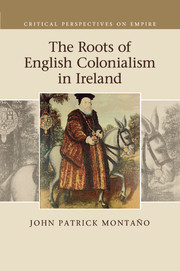6 - A civil offer
the failure to adopt English customs
Published online by Cambridge University Press: 05 February 2012
Summary
From the outset one of my primary themes has been the way that landscape in general, and tillage in particular, was equated with civility. Officials in London considered the transformation of the Irish landscape through cultivation, surveying, measuring, settling, dividing, reordering, constructing, and various other means of control as the surest route to establishing order, promoting civility, and generating revenues in Ireland. The many devices, plots, and plans for the reformation of Ireland produced in the 1500s emphasized the importance of husbandry and tillage in the creation of civil life, while at the same time associating a distinctly English version of civil culture that would emerge alongside the agricultural society they were trying to promote. To be sure, efforts to increase – or at least preserve – English manners in the face of the apparently irresistible native culture appeared most famously during the expansion of Gaelic power in the 1300s that resulted in the Statutes of Kilkenny. These laws were intended to separate the two cultures in the hope of immunizing the civilized descendants of the Anglo-Normans from the degenerative effects of Irish language, manners, habits, and customs. In fact, for much of the Tudor period, the fears of cultural contagion remained throughout the sixteenth century and formed a part of most of the Tudor plans to link civility with tillage and agriculture.
- Type
- Chapter
- Information
- The Roots of English Colonialism in Ireland , pp. 282 - 334Publisher: Cambridge University PressPrint publication year: 2011

